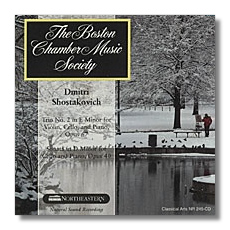
The Internet's Premier Classical Music Source
Related Links
- Shostakovich Reviews
- Latest Reviews
- More Reviews
-
By Composer
-
Collections
DVD & Blu-ray
Books
Concert Reviews
Articles/Interviews
Software
Audio
Search Amazon
Recommended Links
Site News
 CD Review
CD Review
Dmitri Shostakovich

- Cello Sonata in D minor, Op. 40 (1934) *
- Piano Trio #2 in E minor, Op. 67 (1944)
Stephanie Chase, violin
Ronald Thomas, cello
Randall Hodgkinson, piano
* Mihae Lee, piano
Boston Chamber Music Society
Northeastern Classical Arts NR245-CD 56:06
From its quiet, ominous beginning to its frenetic "Dance of Death," Shostakovich's E Minor Trio conveys a mood of desperation present only, perhaps, in his quartets. Chase, Thomas, and Hodgkinson impart a raw edge to this work, giving it rhythmic density that seems exactly right. To their credit, they do not distort the scherzo in the second movement and play it "not too fast, heavily stressed, and ponderous," according to Shostakovich's markings. They make the largo waver between melancholy and bitterness, ending it with a musical question mark. The famed "Dance of Death," repeated in two of Shostakovich's later works, takes on an eerie cast in the final movement. At times we can almost see skeletons wobbling in the mist; at other times, there is someone stumbling around in exhaustion. Its final bars bring it to a trudging, whimpering close.
The Cello Sonata is a much less disturbing piece, although a perfect companion to the Piano Trio. It opens with winsome nostalgia, which cellist Ronald Thomas does not play for sentimentality, like Yo-Yo Ma. There are disturbing trends in this movement, and they burst out in a brutal folk dance, full of pounding and stamping. Thomas and Lee play the finale with the right dose of vitriolic sarcasm. They spare none of its dour Slavonic humor, peppered with intentional "wrong" notes and deranged scales. Hearing this piece after a day of work can restore your sense of irony.
Copyright © 1997, Peter Bates


















